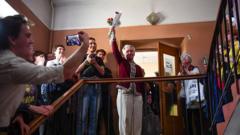St. Petersburg court fines 84-year-old Lyudmila Vasilyeva for "discrediting" the Russian army, highlighting a significant crackdown on dissent against the war in Ukraine.
84-Year-Old Leningrad Siege Survivor Fined for Speaking Out Against War

84-Year-Old Leningrad Siege Survivor Fined for Speaking Out Against War
Lyudmila Vasilyeva, an activist and survivor of the Leningrad Siege, faces legal repercussions for her anti-war protests amid Russia's ongoing military actions in Ukraine.
Russian activist Lyudmila Vasilyeva, an 84-year-old survivor of the siege of Leningrad during World War Two, has been fined by a St. Petersburg court after protesting against Russia’s ongoing war in Ukraine. On Friday, Ms. Vasilyeva was ordered to pay 10,000 rubles (approximately $126) for allegedly "discrediting" the Russian military. The fine stemmed from a protest where she held a handwritten sign imploring people to "stop the war" and take responsibility for global peace.
With Russia intensifying its repression of dissent since its full-scale invasion of Ukraine in 2022, Ms. Vasilyeva's actions attracted notable public interest. Supporters assembled outside the courtroom to cheer her on, capturing moments of her receiving flowers and applause following the hearing. Ms. Vasilyeva expressed feelings of “bitterness” and “hurt” over Russia’s actions, remarking, "I have always been someone who is not indifferent... I have always been on the side of the weak."
Having endured the harrowing Leningrad Siege as a child, during which around 800,000 people perished from starvation and warfare between 1941 and 1944, Ms. Vasilyeva recalled her mother's resolve: "'We will get through everything, as long as there is no war.'" The city of Leningrad regained its pre-Soviet name, St. Petersburg, after the Soviet Union's dissolution in 1991.
Critically engaged in anti-war activism, Ms. Vasilyeva has faced multiple detentions in the previous year and even attempted to run for governor of St. Petersburg, although she was unable to secure enough signatures for her candidacy. Under current Russian law, which broadly defines "discrediting" the army, various forms of protest—including simple anti-war messages—are met with legal repercussions.
With the conflict in Ukraine ongoing for over three years, military analysts estimate substantial casualties among Russian service members, with figures suggesting between 165,000 and 235,000 losses. Despite the toll on both sides, Ms. Vasilyeva’s courage to voice dissent highlights the complex and often perilous climate surrounding free expression in Russia today.





















